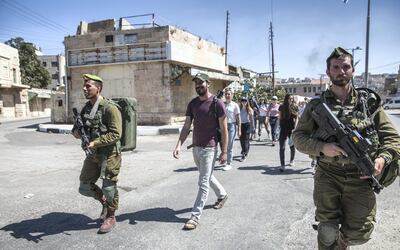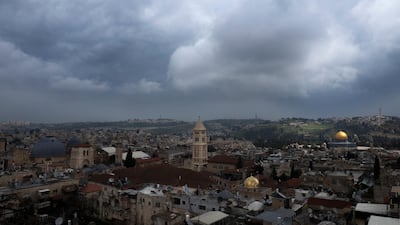A bid to evict a community-led art gallery after it hosted an anti-occupation NGO is a “political intervention” and an indication of a wider campaign targeting tolerant spaces amid growing hostility within Israeli society, critics say.
Nestled among the historic Nachlaot neighbourhood in central Jerusalem is Barbur – a small, non-profit art gallery sitting on street level, surrounded by a beautiful garden. Established in 2005, it is a venue that welcomes all ages, backgrounds and beliefs, offering a tolerant space for people both to create and appreciate art, while acting as a local meeting point and a place for residents to talk openly about the issues affecting the city they live in.
"Jew, Arabs, young, old – everyone is welcome. We have an orthodox branch that uses the space as well as secular groups," gallery manager Michal Rappaport tells The National.
Yet, this vital community hub is being threatened with closure by the authorities and could be evicted next month. Housed in a municipality-owned building, the gallery has found itself in the midst of a “very strong political intervention” despite the fact it is not politically motivated, says the 35-year-old Israeli who’s been involved with the gallery since 2015.
Trouble began for the Barbur Gallery in 2016 when the municipality began to take issue with some of the events it was hosting, deeming them to be politically motivated.
“Barbur has always hosted a lot of social activities and lectures and this hasn’t changed since it opened,” says Ms Rappaport, who explains the events have always been held with the aim of increasing awareness and understanding. “But in the last few years, something within society has changed – if you’re a public space, hosting certain events could mean risking losing that space.”
In February 2017, the gallery hosted controversial NGO Breaking the Silence (BTS) – an organisation founded by former Israel Defence Forces soldiers that campaigns against human rights violations in the occupied territories.
“The Minister of Culture [Miri Regev] asked the mayor to cancel the event and to shut the gallery. We went ahead with the event but we had a small demonstration outside the front of the building attended by right-wing group Lehava and a group of people supporting us,” says Ms Rappaport.

This desire to shut down the gallery by former mayor Nir Barkat and Ms Regev made it to the courts and, in August, the Jerusalem Magistrate Court ruled in favour of the municipality, ordering Barbur Gallery to be closed by February. With the help of Association for Civil Rights in Israel, the gallery appealed and in May a settlement was reached allowing the gallery to stay open for a further three months while city hall reconsiders the gallery’s future in its current location.
During the latest hearing, attorney Tal Yaker, representing the municipality, said city hall believed the events to be of “a political nature and should not be taking place at that location”.
Ms Rappaport says the gallery intends to keep fighting if the decision does not come back in its favour.
“We have to say this is our public space and it is an integral part of the community. Controversial issues should be talked about between ordinary people – it’s so much more effective – and Barbur is a place where people can do that,” she says.
Ms Rappaport adds: “Other places have had to tread more carefully because their livelihoods are at stake.”
It is precisely for this reason that Imbala Café – located down the road from Barbur, close to the 1967 ‘Green Line’ that separates West Jerualem and the occupied east of the city – has created a self-sustaining cooperative run on a volunteer basis by its members. Opened last year, the liberal space, operates as a combined café, library and event venue.
One of its founding members Sahar Vardi, 28, says there has been a significant rise in right-wing hostility over the last five years and tolerant spaces have suffered as a result.
"There are other collectives in the city but nothing like Imbala. They stay away from the political aspect; they are businesses and have a limit on what they can say. We don't have that limitation," Ms Vardi tells The National.
She admits the venue is never completely safe from intervention but, by refusing to accept sponsorship or donors, it has greater freedom than it would otherwise.
“A lot of people talk about the shrinking space of civil society but we felt the physical space was deteriorating,” says Ms Vardi.
Daniel Seidemann is an Israeli attorney specialising in Israeli-Palestinian relations in Jerusalem and the founder of Terrestrial Jerusalem – an Israeli NGO that monitors developments that impact the Israeli-Palestine conflict in Jerusalem.
"Jerusalem is a really tough city to live in. It's becoming increasingly impoverished, increasingly religious – on both sides – and increasingly extreme," Mr Seidemann tells The National.
“In addition, the occupation mentality is taking over Israel. The word ‘leftist’ has been turned into a curse word and any organisations or individuals challenging the occupation are targeted, including groups like BTS and Peace Now.”
Founder of BTS, 36-year-old Yehuda Shaul, believes spaces like Barbur and Imbala are crucial. He explains how his organisation has been increasingly targeted by the Israeli authorities in recent years, beyond Jerusalem. He says in every municipality-owned space where BTS has attempted to hold lectures in the last three-and-a-half years, there have been attempts by the authorities to cancel the events.
“A lot of what we’ve seen from the government until recently has been rhetoric and now we’re seeing a move from rhetoric into action,” Mr Shaul tells The National.
In July last year, Israel's parliament passed a law – dubbed the 'Breaking the Silence bill' – aimed at banning groups critical of the military or the government from giving talks in schools.
“It’s no longer enough just to crush Palestinians, the government feels it has to crush anyone who questions it,” the soldier-turned-activist says. “This is where we are now. It’s very deep. It’s reality.”

